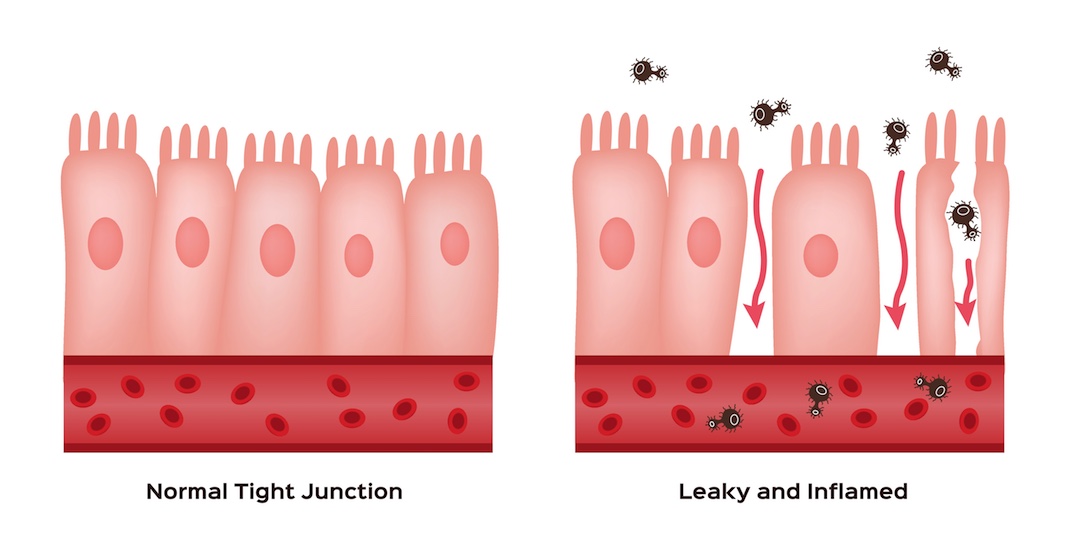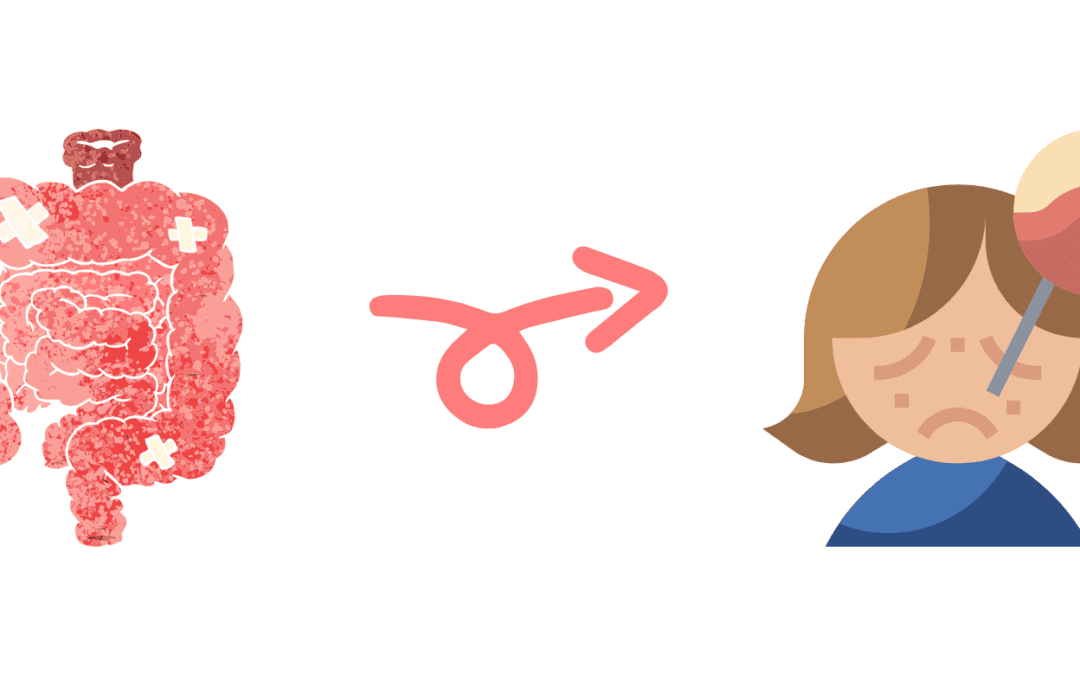Fix your digestion to get clear skin
Naturopaths have long observed the link between an unhealthy digestive system and acne. The gut-brain-skin theory proposes emotional states such as anxiety, depression and psychological stress alter the balance of beneficial gut bugs giving rise to a “leaky gut”. Leaky gut contributes to body-wide inflammation. Inflammation in the skin’s sebaceous glands stimulates excess production of sebum, blocking follicles resulting in pimples and acne lesions.
What is a leaky gut?
Although the phrase “leaky gut” conjures a mental image of a punctured pipe, it’s a lay term for what Doctors refer to as intestinal permeability. Sticking with the plumbing analogy, imagine your digestive system as a long tube running from your mouth to your butt. The inner lining of this tube separates the contents of the digestive tract from the rest of the body. This lining is known as the intestinal barrier and contains channels which selectively allow nutrients and other substances to pass from the digestive system into the blood. The intestinal barrier is composed of adjoining cells locked into place with tight junctions.
In a healthy gut, the tight junctions keep the cells locked into place, and undesirable substance cannot pass. When these junctions become “leaky”, they allow food antigens and lipopolysaccharides (LPS) from gram-negative bacteria to pass from the digestive tract into the blood. The antigens and LPS trigger the immune system resulting in low-grade inflammation.

What causes intestinal permeability?
The intestinal barrier is not like a tap which is either off (no leaky gut) or on (lots of leaky gut). A certain level of intestinal permeability is normal. Low level, transient leaky gut is present in healthy individuals when there’s an infection in the gut (this helps flush out bacteria), and in pregnant women to transfer immune substances between the mother and the foetus.
A leaky gut only becomes a problem when there’s too much for too long. It’s also important to note that generally more than one of the following conditions must be present for it to become an issue.
Things that contribute to intestinal permeability
- Food intolerances (gluten, lactose)
- Western-style diet (high sugar, high fat, high fructose, high animal protein)
- Inadequate protein
- Poor protein digestion (often due to low stomach acid)
- Food additives (glucose, salt, emulsifiers, artificial colours)
- Alcohol (>1 standard drink per day)
- Glyphosate (Roundup) exposure
- Viruses (Epstein Barr)
- Medications, including Non-Steroidal Anti-inflammatories (NSAIDs), Antibiotics. Methotrexate)
- Autoimmune diseases (Crohn’s, Inflammatory Bowel Disease, Coeliac disease, Type 1 diabetes)
- Nutrient deficiencies (Vitamin D, zinc, glutamine and tryptophan)
- Acute psychological stress
- Endurance exercise > 2 hours
- Acoustic stress: loud music, construction noise
- Ageing
How does a leaky gut drive acne?
The LPS on gram-negative bacteria activate the immune system and drive inflammation in the dermis. Skin inflammation increases sebum and proliferation of skin cells (hyperkeratosis), creating an environment ripe for blocked pores.
LPS also alter glucose metabolism, increasing insulin. Excess insulin both feeds the inflammatory fire and contributes to hormone imbalance, especially acne-promoting androgens.
Are there signs and symptoms of leaky gut?
It’s important to note that leaky gut is not considered to be a disease in and of itself but rather a consequence of unfavourable conditions in the digestive system. There is a myriad of possible signs and symptoms relating to the underlying drivers.
Is there a test for leaky gut?
At present, there is a lack of consensus about a “gold standard” test for intestinal permeability. Current tests include the lactulose mannitol test, serum zonulin and stool zonulin. (Zonulin is a protein that loosens the tight junctions). Each of these has limitations. Clinically, I find a functional stool testing provides a better picture of the health of the digestive tract.
Tips to fix your leaky gut
The linking factor with many of contributors to increased intestinal permeability mentioned above is an imbalance in beneficial gut bacteria -a dysbiotic microbiome. This is good news. While we have zero control on things like ageing and only minimal control on virus exposure, we can easily and relatively quickly create a thriving gut microbiome with a few simple diet and lifestyle changes. The even better news is the foundational support of your good gut bugs does not require a massive financial outlay but rather a commitment to some diet and lifestyle changes.
The two significant determinants of a healthy gut are the food we eat and how we cope with stress.
Foods to fix leaky gut
The big picture in terms of this is a consistently healthy diet pattern with a wide variety of nutritious foods:
- Around 30g/day of different types of fibre from fruit and vegetables and whole grains. Try to source produce not sprayed with Roundup.
- Adequate amounts of protein without having excess animal protein.
- Adequate amounts of healthy fats from nuts, seeds, avocado and oily fish
- Eliminate refined grains, sugar, excessive saturated fats, food additives
- Limit alcohol to no more than one standard drink per day.
The Mediterranean diet fits the above pattern.
Food elimination
In general, I am not a fan of long-term elimination of foods, unless you have a diagnosed allergy (gluten for people with coeliac disease or are anaphylactic to nuts or shellfish). However, as a short term healing strategy, it can be useful to temporarily remove certain foods that you are intolerance to promote a speedier recovery.
Specific foods to reduce intestinal permeability
Polyphenols are plant molecules with recognised health benefits. They include
Quercetin: Apples, black and green tea, broccoli (and other brassica vegetables), onions, buckwheat, citrus fruits. Apples are a big winner here as they contain pectin another import fibre for gut health.
Epigallocatechin gallate (ECGC): green tea, blackberries, sour cherries, peaches, nectarines
Anthocyanidins: basil, blackberries, blueberries, cherries, cacao, green tea, grapes, mint, pecans, almonds, pomegranate, purple corn, red onions, red cabbage, rosemary, sage, walnuts
Naringenin: citrus peel, tomatoes,
Genistein: Alfalfa sprouts, chickpeas, flaxseeds, peanuts, peas, prunes, raisins, currants, soybeans
What about supplements?
There is a role for supplements in reducing leaky gut but, as the name suggests, they should be used in addition to diet and lifestyle changes not instead of. I recommend working with a suitably, qualified practitioner to get a supplement prescription that supports your situation.
Supplements useful for reducing leaky gut:
- Zinc carnosine
- Glutamine
- Probiotics: Lactobacillus rhamonus GG
- Saccharomyces boulardii
- Vitamin A
Lifestyle support for leaky gut
Stress management to improve leaky gut
Both physical and psychological stress are detrimental to the intestinal barrier both directly by affecting the integrity of the tight junctions and indirectly by impacting on sleep, reducing stomach acid output resulting in poor protein digestion and increased risk of SIBO.
In the short term, I recommend keeping exercise duration under two hours and intensity at moderate. Make time for plenty of sleep and implement daily stress management techniques to boost your resilience.
The link between the digestive system and the skin is increasingly recognised in health care. Looking deeper than the dermis and correcting underlying issues is a vital step on your clear skin journey.
If you liked this you might also enjoy:
Acne – what is the underlying cause?

Need help with
Norelle Hentschel is an experienced naturopath with a clinic in Stones Corner, South East Brisbane and Telehealth consults Australia wide. She has helped many women get clear skin by naturally treating the underlying cause of their acne.
Want more articles like this?
Join us at Your Skin Remedy – the monthly missive for healthy skin from the inside out. Practical, actionable, and informative. Your clear, glowing skin starts here.
PS. Your inbox real estate is precious. Your Skin Remedy is pitch and promo free. I promise. One email a month — that’s it.


